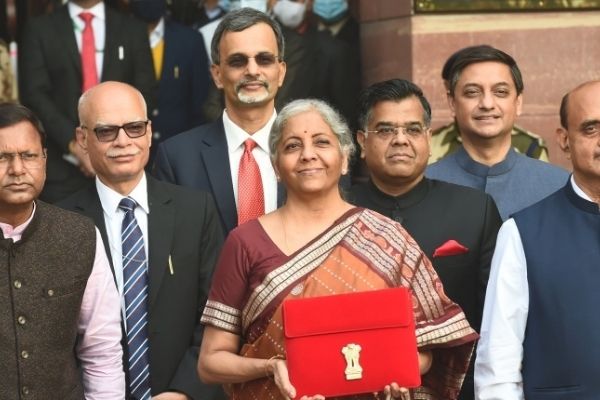The Finance Minister Nirmala Sitharaman on February 1 presented a technology driven budget underlining the importance of digital innovation. In 91 minutes of the presence, the minister focused on financial and digital inclusion, EVs and drones.
For connect the largest Postal Network in the world digitally, she announced complete digitisation for 1.5 lakh post offices and bring them under Core Banking System in 2022. This initiate is likely to boost financial inclusion for the populace residing on the rural areas.
Besides, to honour and celebrate the 75 years of Independence, she announced that 75 Digital banking units will be set up in 75 districts of the country by scheduled commercial banks.
Also Read: Budget 2022: RBI to launch digital rupee, industry leaders welcome the move
Read experts opinion:

Akshay Mehrotra, Co-Founder, and CEO, EarlySalary
Budget2022 focused on digital inclusion. We welcome the Indian Government’s decision to use digital channels to increase access to finance. As a Digital Lender, EarlySalary is delighted to participate in this democratic solution for leveraging demographic-dividend. This will help the middle-class people to afford products and services using responsible-credit mechanisms. As a leading FinTech Industry player, we also welcome the idea of digital banks. Furthermore, making Post Offices a part of the core banking system will immensely benefit every Indian. In a nutshell, these decisions would set precedent for the Digital-Only banks and could become a reality very soon.

Milan Ganatra, Founder & CEO, 1SilverBullet
Firstly, I would like to express my appreciation and welcome the Budget presented by the government, which has been tremendously encouraging for India’s startup ecosystem. Bringing in the unlisted equity taxation at par to the listed, will encourage more Mergers and Acquisitions (M&A) in India, allowing a substantial quantity of wealth to flow into the pockets of founders and investors, bettering the appeal for investors to invest in unlisted equities or startups in the country. The administration is also proposing to form a committee to develop a framework for attracting more investments and monitoring regulations, which is a wonderful step forward from the eyes of the Fintech startup entrepreneur.
Finally, opening various things at the Indian Financial System Code (IFSC) will allow it to become a worldwide financial services centre, fueling a slew of Fintech-related operations. The government has been extremely pro-infrastructure, and they have granted industry data centres status, which is a great move with multiple benefits. Overall, the government has recognised the importance of technology, startups and has assured that there will be adequate and more entrepreneurial opportunities, which will be backed up by government assistance.

Shashank Khade, Co-Founder & Director, Entrust Family Office
This is a Budget that is focused on prioritizing capital expenditure as a key lever for growth, which we endorse as an approach given the multiplier effect of many of these investments. In that sense, the budget augurs well for the economy and the continuing decline in revenue expenditure as a share of total expenditure towards capital expenditure improves quality of expenditure. To put it in context, the 35% increase in capital expenditure, 55% increase in Road sector allocation and 17% increase in railways are significant numbers. On top of this is support to state governments towards capex. Of course, the execution of projects in these areas and in urban infrastructure is key towards enjoying the full benefits of this expenditure. The other point to note is that a larger share of defence capital expenditure is targeted to domestic procurement that could also have second-order implications for R&D and multiplier effects in the economy.
The Budget is extremely future-oriented. Emphasis on digitization of government processes, incentives for startups enabling the flow of capital (lower capital gains for venture investments), clean energy enablers for fundraising and PLI, categorizing data centers and energy storage systems as infrastructure, recognizing gaming as an area of potential, and a general focus on sunrise sectors is evidence of this. The impact of this will be felt over the next decades and not in the short term. The taxation on cryptocurrency while at the same time talking about a digital rupee indicates the government’s recognition of blockchain as an important future technology to enable.
Also Read: Budget 2022 underlines long term beneficial investments: Experts
The gross market borrowing through G-secs for 22-23 at Rs 14.95 lakh crs is higher than the amount expected by the market and has led to a sharp increase in G-Sec yields. However, tax buoyancy is very high and could well surprise on the upside thereby leading to a lower fiscal deficit in the current and coming year than forecasted. However what quantum of issuance would be issued as sovereign green bonds and whether it shall be issued to a new set of investors (viz Foreign Institutions) is a key part we can watch out for. Overall, the credibility of numbers is very high as is evident in the tax growth rates and PSU divestment numbers being very moderate. Indicative of intent to under promise and over deliver.

Harsh Bhuta, Partner at Bhuta Shah & Co LLP
The launch of the digital rupee, which is a digitalform of Fiat currency backed by blockchain is encouraging, but we will have to wait for the Crypto Bill to see the Government’s stance on other private Cryptocurrencies. The Budget, on the other hand, has included a new plan for taxing virtual digital assets such as cryptocurrencies and NFTs. The proposed section 115BBH seeks to specify that where an assessee includes any income from the transfer of any virtual digital asset, the income tax shall be 30% after deducting the cost of the acquisition of such asset. No other deduction in respect of any expenditure or allowance or set-off of any loss shall be allowed while computing income from the transfer of such asset. Further, no set-off of any loss arising from the transfer of virtual digital assets shall be allowed against any income for the current year, and such loss shall not be allowed to be carried forward to subsequent assessment years.
Further, TDS u/s 194S is provided for at1% on payment for the transfer of virtual digital assets to a resident > Rs 50,000 with certain conditions.
Elets The Banking and Finance Post Magazine has carved out a niche for itself in the crowded market with exclusive & unique content. Get in-depth insights on trend-setting innovations & transformation in the BFSI sector. Best offers for Print + Digital issues! Subscribe here➔ www.eletsonline.com/subscription/




















